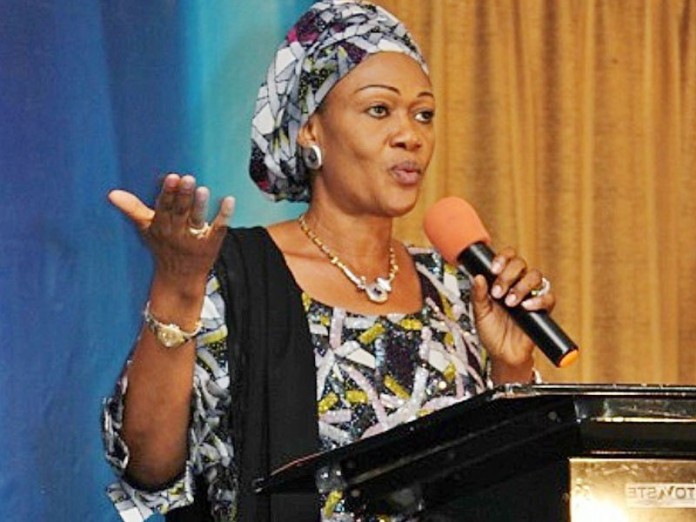Even without clear constitutional provisions backing its existence, which was the main reason for the initial threat by the former President Olusegun Obasanjo to scrap it, the Office of the First Lady of the Federal Republic of Nigeria, has assumed a status that has turned it into almost an institution. Every wife of each of several former presidents as occupant of the office, in one way or another, showed a tendency for the promotion of her personality and a desire for a direct derivation of various kinds of benefit from the position.
Each one of them, while there, unpackaged a programme that was designed and implemented to achieve one kind of objective or another. The late Maryam Babangida’s Better Life for Rural Women, Maryam Abacha’s Family Support Programme, Justice Fati Lami Abubakar’s Women’s Right Advancement and Protection Alternative, late Stella Obasanjo’s Child Care Trust and A’isha Buhari’s Future Assured were very popular initiatives that, at various times, served as platforms for sensitization as well as instruments for the delivery of some services or items to Nigerians.
The nature of the engagement between the Office of the First Lady and a lot of the Ministries, Departments and Agencies (MDAs) of government is such that has virtually made it to become like an extension of the executive arm. Each of the former First Ladies, in her own way, further strengthened the operational framework of the office just for her to be able to accomplish her mission.
Therefore, whichever approach Senator (Mrs) Oluremi Bola Ahmed Tinubu may have adopted to her new assignment as the current First Lady will only be an addition or expansion of the scope of the operations of the office as a result of which it can become a lot more relevant to the governance process in the country. There is the valid assumption that she has already carried out an intensive study of the programmes and styles of most, if not all, of the former First Ladies and has therefore identified all those aspects that require amendments.
Happily, Senator Oluremi has come in well-equipped with the amount of knowledge, experience and antecedents that will enable her discharge her responsibilities quite exceptionally as maximally expected. As a former First Lady of Lagos State and member of the last senate, she must have been sufficiently prepared for the challenges of her new office, which are all about provision of necessary support to the president in terms of the conceptualization and implementation of ideas that are critical to the needs of the people, particularly women and children.
The recent launch, by her, of the ‘Renewed Hope Initiative’ (RHI) as an empowerment programme that, according to her, targets women, youths and children, is a very clear manifestation of a resolve to facilitate the enhancement of the people’s well-being. It is, undeniably, an attempt to build on the efforts of those past First Ladies who, even if incompetently or unsuccessfully, sought to provide succour to the suffering members of the society.
Just like some of the past programmes, the RHI is meant to serve as an intervention in the areas of education, health and agriculture as well as an instrument for the provision of socio-economic empowerment for all deserving Nigerians. By stating, shortly after she unveiled the programme in the Presidential Villa-Abuja, that the RHI will “enable us to assist vulnerable groups,” the president’s wife expressed more than enough intention to make a difference in the implementation of intervention programmes in Nigeria.
But intentions or even clear designs as beautiful as they may sound or appear have their limit. The failure of the previous similar programmes was not just because the intentions or plans were not there, but because the drivers of the process lacked the required quantity of sincerity and seriousness and therefore, unfortunately, indulged in acts that were practically a subversion of the intentions of the originators of the programmes on the one hand and the basic needs of the target beneficiaries on the other.
The assumption that the First Lady is fully prepared for her new duties predicates on the belief that, as already stated, she has identified all the flaws that caused the collapse of some of the past ones and will consequently adopt strategies that can guarantee absolute success. It is continuously expected that her methods for the selection of areas of focus as well as target beneficiaries, generation and utilization of funds, erection of structures of implementation and the assessment of impact will be perfect enough to boost the morale of all those Nigerians who are duly yearning for maximum positive results.
While some of the explanations of the First Lady about the concept, focus and structure of the RHI are clear and encouraging, there are others that have not really sunk in the people. The fear that, unless some components of the programme are made a lot less cumbersome, it will be easily reduced to an elitist affair is quite dominant.
If, for example, the clarification she made that the unspent 2023 presidential campaign funds of the All Progressives Congress (APC) would be readily used for take-off before donations by private companies, international donor agencies and Non-Governmental Organizations begin to trickle in is quite convincing, the clear decision to make the wives of state governors serve as the coordinators of the programme in their respective states is widely dismissed as unviable. The participation of the governors’ wives at such a critical level of implementation, in addition to the wife of the Vice President, wife of the Chief of Staff to the President, wife of the Senate President and the National Women Leader of the APC as members of the Governing Board, is making it to look like just another opportunity for the wives of the privileged politicians to make huge fortunes for themselves.
The particular requirement that target beneficiaries must register with the Corporate Affairs Commission of Nigeria and acquire bank account before they can access RHI’s packages is a good strategy for the easy delivery of assistance on which, however, the people need to be adequately sensitized. A wide coverage of the target beneficiaries is possible only when they are provided with the kind of explanations that will make it easy for them to key into the initiative.
Programmes of the First Ladies, though considered wasteful or take-over of responsibilities of government or even usurpation of powers of officials of government by the leaders’ wives, have continued to serve as platforms for advocacy on the rights of women, children and youths. Mrs Tinubu can be a far greater achiever than her predecessors in this regard if she ensures the effective engagement of critical stakeholders in the implementation of the programme.





